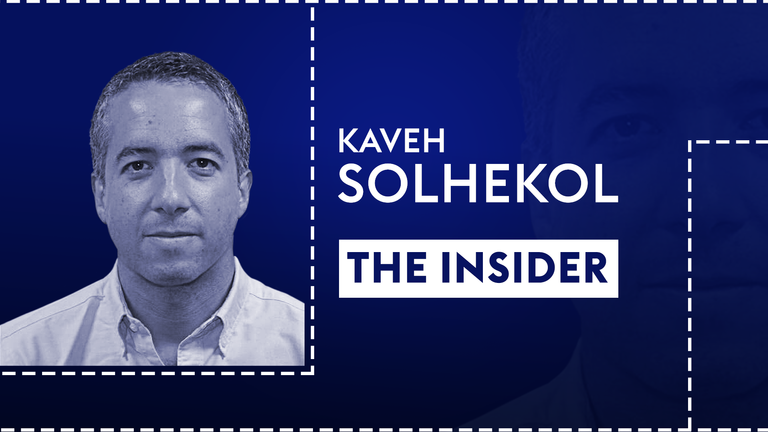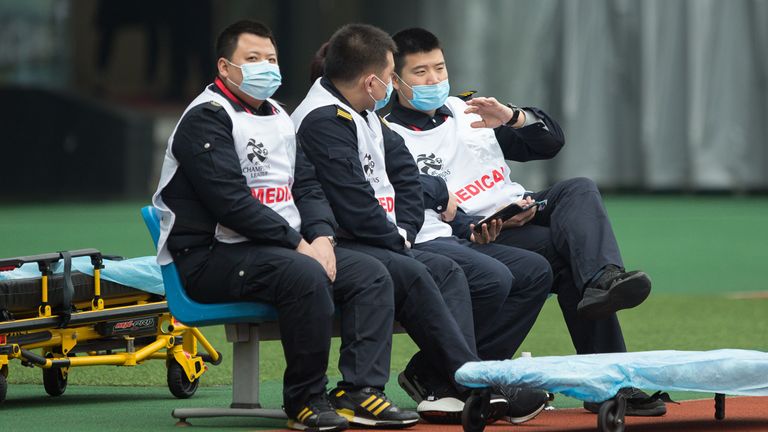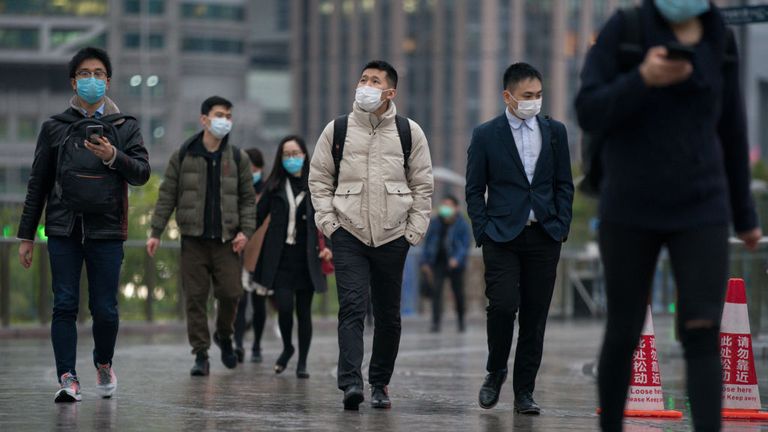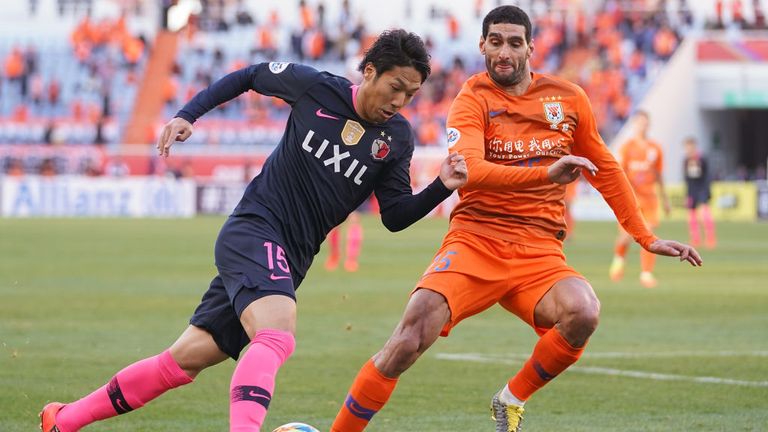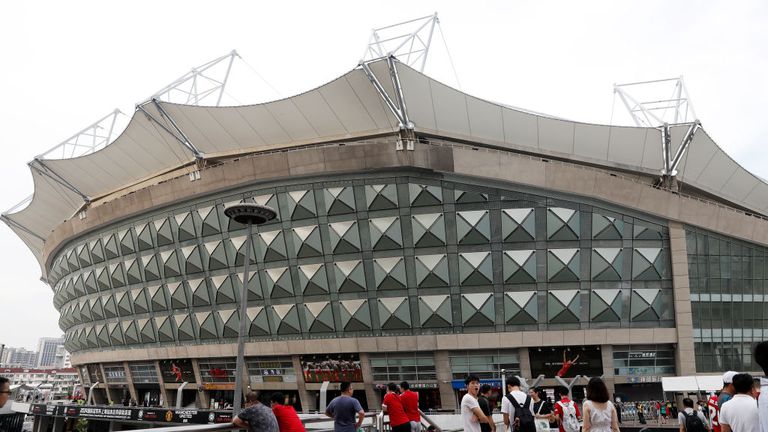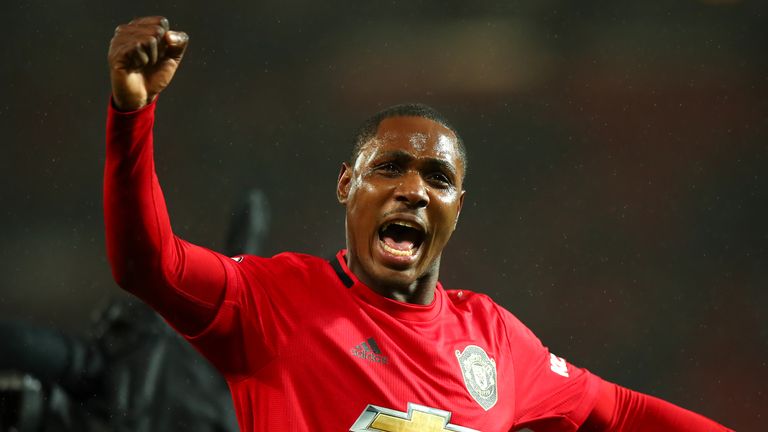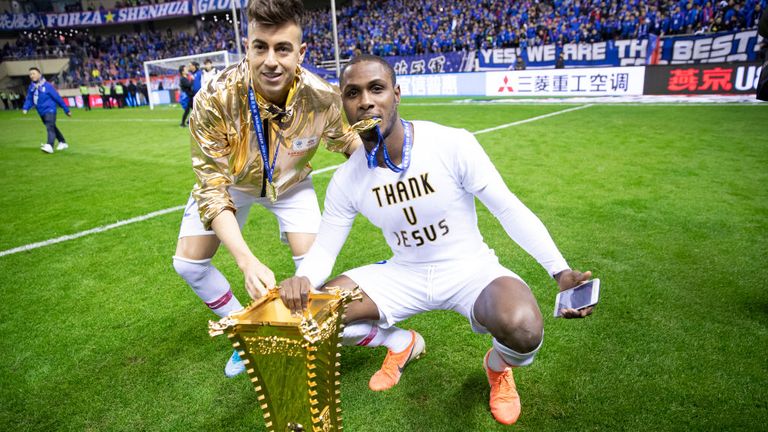The Insider: Football consultant Cameron Wilson on lockdown life in China
In a special Insider Q&A, Kaveh Solhekol chats to football consultant and Shanghai resident Cameron Wilson and asks - how do you kick off again after a pandemic?
Tuesday 7 April 2020 16:33, UK
Cameron Wilson has lived and worked in Shanghai as a football consultant and adviser for the past 15 years. He is also the man behind the influential website Wild East Football.
The coronavirus pandemic started in China and after a prolonged lockdown, people there are taking their first tentative steps towards getting back to normal life. On Tuesday, the Chinese government reported no daily deaths from the virus for the first time since January.
Here, Cameron talks to Sky Sports News' Kaveh Solhekol about what lessons others can learn from his own experiences in China, and what it all means for our future and the future of football.
"Hope is like a path in the countryside: originally there was no path, but once people begin to pass, a way appears" - Chinese author Lu Xun
Cameron, thank you for your time. First of all, how has the coronavirus impacted life in China?
Almost everything was shut down at Chinese New Year. It felt a bit like it was just an extension to the Chinese New Year holiday, so I think the mood was relatively relaxed right at the start.
But people here took lockdown seriously from the beginning. At first, it seemed like it was just affecting Wuhan but quickly everyone realised it wasn't. The holiday kept getting extended, and extended again... and the situation started to drag on and on.
In Shanghai, for a city of 25 million to suddenly to be more or less shut down in the space of a few days and have barely anyone out on the streets, was quite stunning.
Public transport was barely used. Restaurants, bars, clubs, cinemas, schools, anywhere people gather, were all closed.
The place went into a very peculiar hibernation quite suddenly, and neighbourhood wardens and volunteers were going around telling people to stay indoors unless for essential trips to the supermarket. The shelves got a bit bare at first - especially with things like instant noodles, which is China's favourite convenience food, selling out fast - but restocks came fast too. In Shanghai, everything was orderly - there was no panic buying. People took what was a really big disruption in their stride. It was really civilised and people were concerned but calm.
What about you personally? What impact has it had on your life and work?
I have to say being in my apartment for a month - barely leaving except for brief supermarket trips out into the deserted streets, and hearing the news updates about the virus each day - was just such a bizarre experience that it defies description.
It's been nearly two and a half months now for us, and although things are quite a bit more normal than they were, there is still a long way to go and there is still no word on when schools in Shanghai will go back. So I rely on my mother-in-law to look after my four-year-old daughter.
Neither myself nor my wife went back to normal work routines until the start of March. We work for different companies but we are fortunate in that we are paid normally and touch wood, our jobs are stable. Others have not been so lucky.
I'd say the most difficult thing has been the social aspect. Being a foreigner in China at this time, when the borders are closed to outsiders, and certain voices in China are trying to say the virus is a foreign disease, has been hard to take.
To be really honest, having lived in Shanghai for 15 years, previously I've always been the one trying to encourage those back home or non-Chinese people to see things from China's point of view and to push the positive side of China, because there are so many great things here which the West doesn't really hear about. But now I feel less motivated to do this because I don't want to be associated with pro-China propaganda. I just want to tell the truth - that is, China is like anywhere else, there's good, there's bad, and there's ugly.
The story being pushed by some official channels that the virus didn't necessarily come from China is really irresponsible since there is no evidence to support this. All it's doing is causing arguments inside and outside China between Chinese and non-Chinese people and this is not a time for such arguments.
That the virus originated in China does not in itself mean China did anything wrong. It could have broken out anywhere. Instead, all sides are playing a blame game, and pushing propaganda which is damaging everyone and I really regret that. Everyone should just own up to what went wrong and where, and move on by solving it together.
When did the lockdown start in Shanghai? Has it finished now and is life getting back to normal?
From around the last week in January to the last week in February, although some housing compounds were restricted a bit more to only one person being able to leave the house every two days.
Luckily where we live, we were free to come and go. Right now, pubs and clubs are mostly still closed, and so are cinemas. Restaurants are open again, but people are being kept a table apart, things like that. Temperature checks are still being carried out in most places, and a lot of people are still having to report their health status to their employers regularly.
What has it meant for Chinese football? What have clubs and players been doing?
The outbreak started about a month before the season was about to begin so in some ways, it could have been worse than if it had struck when the season was underway. Most clubs were training overseas when it broke out, so they stayed where they were - that was until it started spreading everywhere else, then teams headed back to China. However, the closing of the border to foreigners the other week means that a lot of clubs have players and staff in other countries and who are unable to get back. This is a big deal for the CSL because clubs' success hinges heavily on their foreign talent. Right now, clubs are mainly training in their home cities waiting for news for when the season might finally kick off.
Is football likely to start any time soon? Have any plans been put in place?
There have been a few stories going around that the league would start in mid-April; then it was said to be starting in May. But with some clubs' foreign players stuck overseas, this makes it way less likely the league will start up again soon.
Right now, there seems to be no firm indication about a start date. With schools in Shanghai and most parts of China still not back, plus some tourist areas in Shanghai being closed again recently, it suggests the authorities think the situation still isn't safe enough.
What impact has this had on foreign players? What has their attitude and behaviour been like during the lockdown?
Most of the foreign players seem to be going with the flow and keeping a low profile, from what I can see. I think quite a few returned to China when it became clear the outbreak had hit Europe and North America.
When do you think football will re-start? Are players training again now?
I think all or most clubs are training in their home bases at the moment but it must be pretty odd for everyone to be practising all day yet not knowing when your next competitive game is.
Right now, I honestly don't see the season starting any time soon. There are too many aspects of normality which need to be in place, which have yet to return. At the end of the day, football, like many other things, is very much non-essential in China, the same as it is everywhere else so I'd expect spectator sports to be one of the last things to come back.
If the Chinese Super League re-starts, will it be behind closed doors?
I think that is quite likely. Although personally I feel it's better to wait until the whole thing has cleared enough for fans to be let into the ground to see their team, even if stadiums have temporary reduced capacities.
Will there be lots of checks before fans are let in? Will there be masks, temperature checks, social distancing etc inside stadiums?
I would imagine so. Getting into a football match is a bit of an ordeal at the best of times, with facial recognition at Hongkou Stadium in Shanghai for god knows what reason, showing of ID cards, searches of pockets and bags, police checking banners for taboo slogans or words, waits to get in or out, police stopping fans from singing harmless songs on the street... you name it, they check it! So I doubt it's going to get any easier.
Is there an appetite for football to return?
Yes, definitely. Chinese Super League club fans want it back - there's a feeling among many that this is the longest period of time in their entire lives they have not seen their team play. It's been over four months now without any games. But at the same time, no-one is holding their breath.
Have players and managers taken a pay cut?
This hasn't been an issue in China. Although players and staff at top CSL clubs are well paid, there isn't the same chasm as there is in the EPL.
Many of the foreign stars here are of course very well paid, but that's accepted by the fans for the most part. Clubs are not really seen as pillars of the community here either so there is not the same expectation that they give back to the community.
Clubs here are seen as exactly what they are and no more - institutions supported by big business for political reasons and other interests way above the level of the average man on the street. For the most part, Chinese fans expect the government to sort things out, and not clubs, because they are not profitable at all when compared to EPL outfits.
How will Chinese football change because of this? What are the big challenges? For instance, will there be fewer transfers in the future?
Because the football ecosystem in China, and the league structure, is relatively undeveloped and unsophisticated compared to Europe, there is less potential for damage.
A lot of things, such as non-league or even just lower-league clubs run on shoestring budgets or less, don't really exist here. I don't foresee a lot of change in football here.
Fans might be a bit slow to return to stadiums in big numbers until the virus has totally passed, but then again by the time they get back in, perhaps everyone will just be so keen to get back to normal life.
So I just don't know. I think any changes to football will reflect the impact of the virus on society in general. Perhaps once it's all over, people will have a more balanced and diverse view of what the most important things in life are and start to see getting exercise, playing sports, and getting together to watch sports as things they really need to do more of, rather than something to do only when they have a lot of time on their hands.
What do you make of the Odion Ighalo situation? Do you think he will return to Shanghai Shenhua when his loan at Manchester United runs out?
I was shocked that he went to Manchester United, after a few years playing in China. However, he's shown everyone that he never lost his edge. I think it's obvious he would like to stay at United, but it might come down to which league - the CSL or EPL - can get back to normality first.
Shenhua are quite rightly going to want a decent fee for him, so United will have to balance that against the uncomfortable reality that no-one currently knows when their next match will be.
Either way, China is ahead of everyone else as the virus broke out here first, so China is most likely to return to full normality and get its football back up again sooner than the UK. Generally speaking, players need to be playing to get paid, so Ighalo may face a complicated decision.
Would he be welcomed back if he returned? Do Shanghai Shenhua want him back? How much would they ask for him if Manchester United wanted him?
Hard to say how much a fee would be. I read in the Chinese football media a figure of £15m had been mentioned. That seems like pocket change, but who knows? If he came back, he would be welcomed for the most part. But he's not universally loved because he left the club for a month last summer to play in the Africa Cup of Nations, following an injury. So he was out for something like two to three months. Some of the fans are very hypocritical - if a Chinese player stayed with his club in Europe instead of playing for China in an important tournament, you would never hear the end of it.
What lessons can we learn in Europe from what has happened in China?
China made a mess of things in the beginning by trying to cover up the outbreak, and then the authoritarian and bureaucratic side of things led to vital time being wasted whilst some parts of the system were paralysed waiting on an "official" response and a way to deal with it. But since then, China's measures have been exemplary.
People don't understand that both these things can be true - yes, China screwed up, especially with the arrest of the Wuhan doctor who later died. But after that, people took social distancing really seriously, followed instructions from authorities, wore masks, and so on.
Compare that to the UK - people heading off to the beach, countryside, pub, etc as if it was a bank holiday weekend. Honestly, Europe looks quite ridiculous from this angle, because there was so much time and information available to make the right decisions.
Instead, people have lost their lives because governments - and, more importantly - ordinary citizens just didn't take the warnings seriously enough.
There are some things China could do better, but the attitude of the Chinese people in a time of crisis is exemplary and has undoubtedly saved many lives here. China is collectivist and socialist, and people consider society at large's needs.
In Europe, right now at least, it just looks as if many people are just selfish and thoughtless. People think their own rights are more important than others, but they can learn from China that respecting other's rights actually helps you safeguard your own rights, health and opportunities.
How long do you think it will be before life gets back to normal in China?
Honestly, I don't expect life to return to full normality until early next year at the earliest. That is how long it will take for most people to either catch the disease and recover from it, or get vaccinated, so that the virus is properly under control.
I'm no virologist or expert but that seems to be what the situation looks like, from reading between the lines. I don't think this view is being widely stated, because it's really not what people want to hear. Lockdowns etc should end much sooner than this, but there will be a lot of disruption still to come after that.
Finally, what do people in Shanghai think about President Trump calling the disease 'the Chinese virus'?
I think most Chinese realise that it came from China, but feel Trump is encouraging racism against people of East Asian appearance in the US. Generally, Chinese people don't have as big a problem as westerners do with authoritarian and brash figures like Trump, because they respect strength and think that leaders can say what they like.
There are some Chinese who are duped by these conspiracy theories that it somehow came from somewhere else, but most of them aren't that stupid and think Trump's comments are just totally unnecessary, and / or downright offensive. Chinese people are indirect by nature - they would much prefer that attention isn't drawn to where the virus came from, and many I have spoken to say it doesn't help focusing on where it came from.
The saddest thing of all is that the virus has exposed cruelly how poor global leadership is in general and how a co-ordinated response has been almost completely lacking, despite the blindingly obvious fact that the virus does not care about borders, politics, race, religion or any other division or label people give themselves. It is equally deadly to everyone, yet... here we are in the midst of a real shambles.
